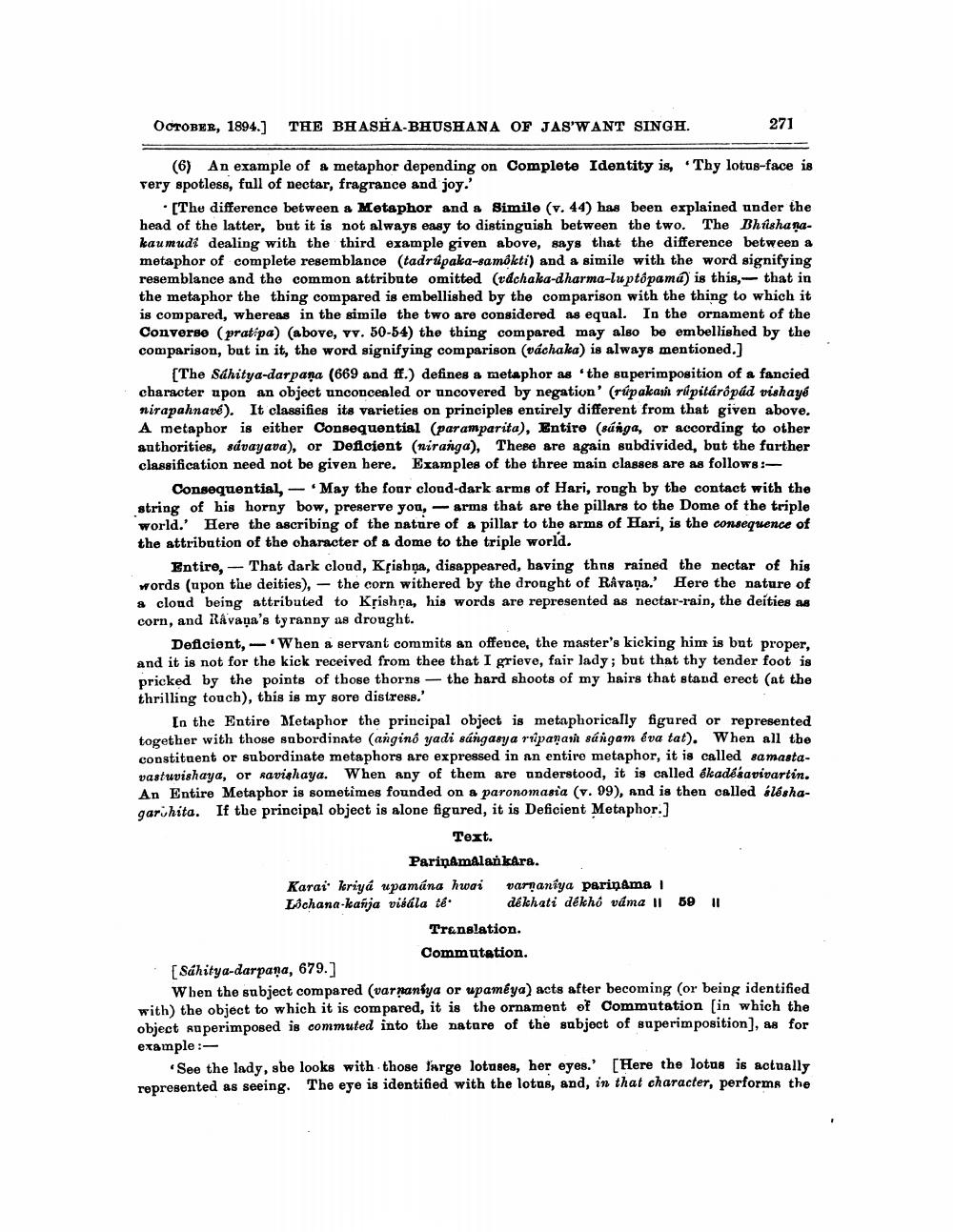________________
OCTOBER, 1894.] THE BHASHA-BHUSHANA OF JAS'WANT SINGH.
271
(6) An example of a metaphor depending on Complete Identity is, Thy lotus-face is very spotless, full of nectar, fragrance and joy.'
· [The difference between a Metaphor and a simile (v. 44) has been explained under the head of the latter, but it is not always easy to distinguish between the two. The Bhishanakaumudi dealing with the third example given above, says that the difference between a metaphor of complete resemblance (tadrúpaka-samôkti) and a simile with the word signifying resemblance and the common attribute omitted (rdchaka-dharma-luptôpama) is this, that in the metaphor the thing compared is embellished by the comparison with the thing to which it is compared, whereas in the simile the two are considered as equal. In the ornament of the Converse (pratípa) (above, vv. 50-54) the thing compared may also be embellished by the comparison, but in it, the word signifying comparison (vachaka) is always mentioned.]
[The Sáhitya-darpana (669 and ff.) defines a metaphor as 'the superimposition of a fancied character upon an object unconcealed or uncovered by negation' (rúpakan rüpitáropád vishaye nirapahnavé). It classifies its varieties on principles entirely different from that given above. A metaphor is either Consequential (paramparita), Entire (sunga, or according to other authorities, savayava), or Deficient (niranga), These are again subdivided, but the farther classification need not be given here. Examples of the three main classes are as follows:
Consequential, May the foar cloud-dark arms of Hari, rongh by the contact with the string of his horny bow, preserve you, - arms that are the pillars to the Dome of the triple world.' Here the ascribing of the nature of a pillar to the arms of Hari, is the consequence of the attribution of the character of a dome to the triple world.
Entire, -- That dark cloud, Krishna, disappeared, having thus rained the nectar of his words (upon the deities), - the corn withered by the dronght of RÂvaņa. Here the nature of a cloud being attributed to Krishna, his words are represented as nectar-rain, the deities as corn, and Råvaņa's tyranny as drought.
Deficient, 'When a servant commits an offence, the master's kicking him is but proper, and it is not for the kick received from thee that I grieve, fair lady; but that thy tender foot is pricked by the points of those thorns -- the hard shoots of my hairs that stand erect (at the thrilling touch), this is my sore distress.'
In the Entire Metaphor the principal object is metaphorically figured or represented together with those subordinate (angino yadi sángasya rúpana sárgam éva tat). When all the constituent or subordinate metaphors are expressed in an entire metaphor, it is called samastavastuvishaya, or Ravishaya. When any of them are understood, it is called ékadósavivartin. An Entire Metaphor is sometimes founded on a paronomasia (v. 09), and is then called bléshagarchita. If the principal object is alone figured, it is Deficient Metaphor.]
Text.
Pariņāmalankara. Karai keriya upamana hwai varnaniya parinama Lichana-kafija visala té d ékhati dékhő váma 11 59 11
Translation.
Commutation. [Sahitya-darpana, 679.]
When the subject compared (varnaniya or upaméya) acts after becoming (or being identified with the object to which it is compared, it is the ornament of Commutation in which the object superimposed is commuted into the nature of the subjoct of superimposition), as for example :--
See the lady, she looks with those large lotuses, her eyes. [Here the lotus is actually represented as seeing. The eye is identified with the lotus, and, in that character, performs the




